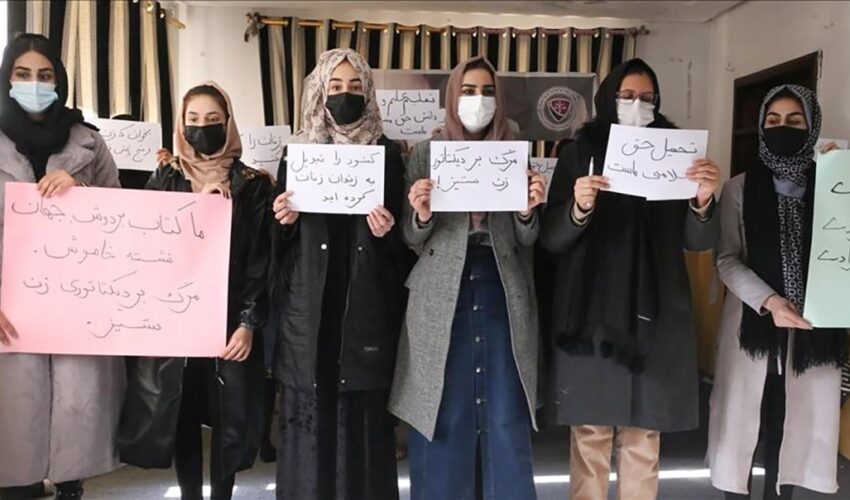Taliban Ban on Education: A Shocking Calamity in 21st Century

By: Farima Nawabi
I wonder how people talk about human rights and equality while millions of girls are deprived of an education in Afghanistan. Getting an education is a human right, and Afghan girls are deprived of their fundamental rights.
After the ban on the education of female students above grade six in March 2022, they took the restrictions one step further and banned education for all Afghan girls in December 2022. Afghan female students are officially excluded from any education in Afghanistan. Girls are not allowed to get primary or secondary education. In addition, they cannot attend universities, and women are not allowed to have a job or an income.
The order comes after 35 other orders that already restricted all aspects of life for Afghan women, including working in government institutions, national and international NGOs, getting an education, traveling long distances alone without a male guardian, and many more.
The recent ruling is their harshest restriction on women since they seized power in August 2021. With these restrictions, Afghanistan has become the most totalitarian country for women in the whole world in the 21st Century.
I do not recall any other violation of human rights with this scale and harshness anywhere in the world. This is a full manifestation of gender apartheid in practice. Around 15 million girls and women have been deprived of all fundamental rights. Without a doubt, it is a serious crime against humanity.
The price of the ban on all sorts of education is very high for the devastated Afghan society after 44 years of war and instability. By banning girls from school and preventing them from getting an education, girls are practically imprisoned in their own houses, which comes with consequences such as child marriages, domestic violence, selling of young girls, suicides, mental health challenges, severe depression, and many more problems to come.
The financial cost of the ban on girls’ employment and education is not less than other aspects. The latest figures on the prevention of girls’ education in Afghanistan show that approximately four million girls are now out of schools and universities. Suppose these girls could complete their education and enter the job market. In that case, their contribution to the Afghan economy could have been around 6 billion dollars, which would be more than 2,5 percent of Afghanistan’s GDP. Sadly, this contribution is wrecked.
Each further year of the education ban increases the human and capital cost to a community already dying of hunger and famine. The financial loss from female education is massive and will rapidly increase in the coming years if the Taliban stay in control and schools remain closed.
While the financial damage is enormous, the social devastation is even greater. The Taliban denied women and girls any liberty and forbade them from being in public unless accompanied by a close male relative. By forcing women out of society and forcefully making them entirely dependent on a man, the Taliban has divided every household into upper and lower classes, which creates hostility inside every house. In the long run, an uneducated deprived woman under the absolute authority of a man becomes an enslaved person deprived of all sorts of rights.
The Taliban enacted stark gender policies and justified them with the claim that the Sharia supports such inhumane measures. However, The Taliban’s claim is nowhere in the Quran, the holy book of Muslims. It has also never been practiced in any of the countries with a Muslim population since Islam was introduced. The Taliban’s interpretation of Islam is ugly and damaging. It has dismantled half of society with devastating consequences.
Human rights organizations/institutions, including the United Nations, have a moral obligation to stand with the women and girls of Afghanistan. They must stand for human rights values and principles and advocate for justice and equality. They need to be the voice of those women and girls whose voices have been silenced by a group of medieval tribal men.
If we cannot support the women and girls in Afghanistan for having the right to education, which is a fundamental right of any human today, we will not have the credibility or the authenticity to claim the authority to support human rights, values, and principles of any other society tomorrow and, in the years to come.
By: Farima Nawabi
I wonder how people talk about human rights and equality while millions of girls are deprived of an education in Afghanistan. Getting an education is a human right, and Afghan girls are deprived of their fundamental rights.
After the ban on the education of female students above grade six in March 2022, they took the restrictions one step further and banned education for all Afghan girls in December 2022. Afghan female students are officially excluded from any education in Afghanistan. Girls are not allowed to get primary or secondary education. In addition, they cannot attend universities, and women are not allowed to have a job or an income.
The order comes after 35 other orders that already restricted all aspects of life for Afghan women, including working in government institutions, national and international NGOs, getting an education, traveling long distances alone without a male guardian, and many more.
The recent ruling is their harshest restriction on women since they seized power in August 2021. With these restrictions, Afghanistan has become the most totalitarian country for women in the whole world in the 21st Century.
I do not recall any other violation of human rights with this scale and harshness anywhere in the world. This is a full manifestation of gender apartheid in practice. Around 15 million girls and women have been deprived of all fundamental rights. Without a doubt, it is a serious crime against humanity.
The price of the ban on all sorts of education is very high for the devastated Afghan society after 44 years of war and instability. By banning girls from school and preventing them from getting an education, girls are practically imprisoned in their own houses, which comes with consequences such as child marriages, domestic violence, selling of young girls, suicides, mental health challenges, severe depression, and many more problems to come.
The financial cost of the ban on girls’ employment and education is not less than other aspects. The latest figures on the prevention of girls’ education in Afghanistan show that approximately four million girls are now out of schools and universities. Suppose these girls could complete their education and enter the job market. In that case, their contribution to the Afghan economy could have been around 6 billion dollars, which would be more than 2,5 percent of Afghanistan’s GDP. Sadly, this contribution is wrecked.
Each further year of the education ban increases the human and capital cost to a community already dying of hunger and famine. The financial loss from female education is massive and will rapidly increase in the coming years if the Taliban stay in control and schools remain closed.
While the financial damage is enormous, the social devastation is even greater. The Taliban denied women and girls any liberty and forbade them from being in public unless accompanied by a close male relative. By forcing women out of society and forcefully making them entirely dependent on a man, the Taliban has divided every household into upper and lower classes, which creates hostility inside every house. In the long run, an uneducated deprived woman under the absolute authority of a man becomes an enslaved person deprived of all sorts of rights.
The Taliban enacted stark gender policies and justified them with the claim that the Sharia supports such inhumane measures. However, The Taliban’s claim is nowhere in the Quran, the holy book of Muslims. It has also never been practiced in any of the countries with a Muslim population since Islam was introduced. The Taliban’s interpretation of Islam is ugly and damaging. It has dismantled half of society with devastating consequences.
Human rights organizations/institutions, including the United Nations, have a moral obligation to stand with the women and girls of Afghanistan. They must stand for human rights values and principles and advocate for justice and equality. They need to be the voice of those women and girls whose voices have been silenced by a group of medieval tribal men.
If we cannot support the women and girls in Afghanistan for having the right to education, which is a fundamental right of any human today, we will not have the credibility or the authenticity to claim the authority to support human rights, values, and principles of any other society tomorrow and, in the years to come.


Barakat Rahmati

Nazeela Elmi

Ahmad H. Najmpoor





